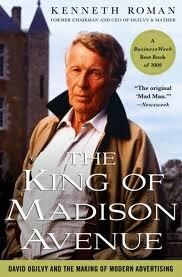Book Review: The King of Madison Avenue
Kenneth Roman joined Ogilvy & Mather in 1963, stayed for 26 years, and was the third successor to David Ogilvy. He wrote this book to assess David Ogilvy's legacy. It's a very balanced look at Ogilvy's entire life, and his major contributions.David Ogilvy was born June 23, 1911 (same year as Ronald Reagan), the fourth of five children, in Surrey, southwest of London. He described himself as a Scot. He dropped out of Oxford, spent 1.5 years as a chef in Paris, sold expensive stoves in Scotland, and in 1935 started at Mather & Crowther, the agency run by his brother in London.He arrived in the USA in 1938, where he went to work for Gallup, and in 1942 he worked for British Intelligence as part of the War effort. In 1946, inspired by the lifestyle of the Amish, he bought a farm in Lancaster, PA, which he sold two years later as farming was "tedious." He opened Ogilvy & Mather in 1948.He didn't believe in growth for the sake of growth; he turned down 20 accounts in 1955 alone, including the Edsel, and Charles Revlon (whom he believed to be a real SOB). He decided he had to like the customer personally before accepting them. Although he was a lifelong smoker, he refused to work on cigarette accounts once the health issues became known. He turned down Xerox, which he regretted deeply, since a competitor got rich off the stock.He didn't like speculative work, saying, "We don't make love until we're married." Warren Buffet was an early investor, and Ogilvy used to introduce him as the man who made more money from O&M then he did.He was mentored by three friends that were also building professional service firms: Marvin Bower of McKinsey; Leonard Spacek, Arthur Anderson; and Gus Levy of Goldman Sachs. These friendships inspired Ogilvy to create a strong culture based on beliefs and principles, which he wrote extensively about, some of which is quoted in this book. It's as relevant today as when he wrote it. Three that I particularly liked were:
He placed Russian matryoshka dolls at the board of director meetings, with a piece of paper in the tiniest doll: "If you hire people who are smaller than you are, we shall become a company of dwarfs. If you hire people who are bigger than you are, we shall become a company of giants.""You cannot bore people into buying.""The consumer is not a moron. She if your wife. Don't insult her intelligence."
He took on the Shell account on a fee basis, rather than commission. JWT begged him not to do it, as it would ruin the industry. By 1970 Ogilvy claimed that one-half of customers were charged fees, not commissions. In his book, Ogilvy on Advertising, he claims credit for bringing the billable hour to agencies. A huge mistake!He purchased a chateau in France, and retired there in 1973. He died in 1999, age 88.So what's Ogilvy's legacy? The French magazine Expression named 30 men who contributed most to the Industrial Revolution (Edison, Einstein, Keynes, Lenin, Marx): Ogilvy was number seven. He was labeled "the Pope of modern advertising," which he loved, even though he was a fervent atheist who had a fascination for the Catholic church. He was never knighted (like Martin Sorrell), but was named Commander of the British Empire.He ranks #4, behind Bill Bernbach, who Roman says had a greater influence on modern advertising, along with more disciples; then Marion Harper and Leo Burnett. Ogilvy's greatest contributions:
- Big Ideas
- The concept of brands and brand image
- Direct marketing
- Intelligence of the consumer
- Payment by fees
- He detested billboards
All told, this is very well-written book about a fascinating life. Worthwhile read.
